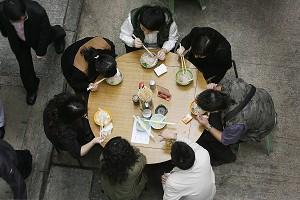A recent survey conducted by China’s Chinese Academy of Social Science (CASS) reveals that Chinese citizens believe the economic reforms of the past 10 years have most greatly benefited China’s Party cadres and government officials. Farmers and factory workers were perceived to have benefited the least.
Survey participants included both urban and rural residents. Nearly 30 percent of those polled believed that the Party cadres and government officials benefited most from recent economic reforms. Performing artists, small business owners, managers of state-owned enterprises and professional and technical personnel also ranked highly. Farmers, factory workers and urban farm laborers were seen to have benefited least from economic reforms.
Wen Wei Pao, one of the most widely circulated newspapers in Hong Kong, quoted Li Peilin, Director of the Institute of Sociology of the CASS.
“Surveys conducted in 2002 established similar voting patterns,” said Li. “Current results again reflect the Chinese public’s continuing perception that the Party cadres and government officials are at the top of the list of those benefiting most from recent economic reforms. Congruent with this perception is the continuing belief that the Party cadres and government officials have benefited most from corruption.”
Liu Xiaozhu, a Chinese scholar of social science now living in the United States, believes that the poll reflects the inequitable distribution of wealth under China’s new class system.
“I feel that the survey is truthful, except it did not involve certain groups such as students, soldiers and teachers. Dividing respondents into more demographic groupings might be better and more convincing, but in general it reflects the overall situation in the past 10 years of economic reform and the opening of China’s economy to the West,” said Liu Xiaozhu.
“Under the dictatorship of the Chinese Communist Party (CCP), government officials have always been the largest group to benefit from economic reforms and the opening of markets to the West. Today in China there is a broad discrepancy between the rich and the poor,” said Fang Jue, a former government official now living in the United States.
“The changes have occurred at both ends of the economic spectrum. In previous years, the top economic strata were most often occupied by high-ranking CCP officials. Today, there is a large group of private entrepreneurs who also occupy the top strata. These private entrepreneurs have often amassed their wealth through corrupt business practices in collusion with administrative officials. In the past, the lowest strata of society had been occupied by farmers. Today, with advancing economic reforms, factory workers have joined the farmers at this position.”
Fang Jue also pointed out that according to the Chinese Constitution, China is a socialist country led by the working class. But in fact China is led by the Chinese communist regime and its Party and political officials. It is a capitalist country in which business people and government officials collude with each other. Fang believes that related the surveys reflect this reality.
Liu Xiaozhu believes that inequities of the current economic system are a result of the inequities of the Chinese political system. In his view, it’s difficult to curb mankind’s selfish impulses. Therefore, we must establish a fair political system. Only then will people’s economic interests be safeguarded.
“This situation is related to the fact that farmers have no political rights. To solve the problem, we must work to give all people of China equal political rights and human rights. If everyone, including any rural resident, has the right to vote, human rights will be protected, and people’s rights to land and resource will not be deprived by officials,” said Liu Xiaozhu.
The survey by the CASS revealed that the issues which most concerned the average Chinese are the following: expensive to see doctor, decreasing employment opportunities and increasing unemployment, growing income gap either among urban residents or between urban and rural residents, rampant embezzlement and corruption, not well-established endowment insurance system, rising educational costs, high housing prices and serious problems with social security.



